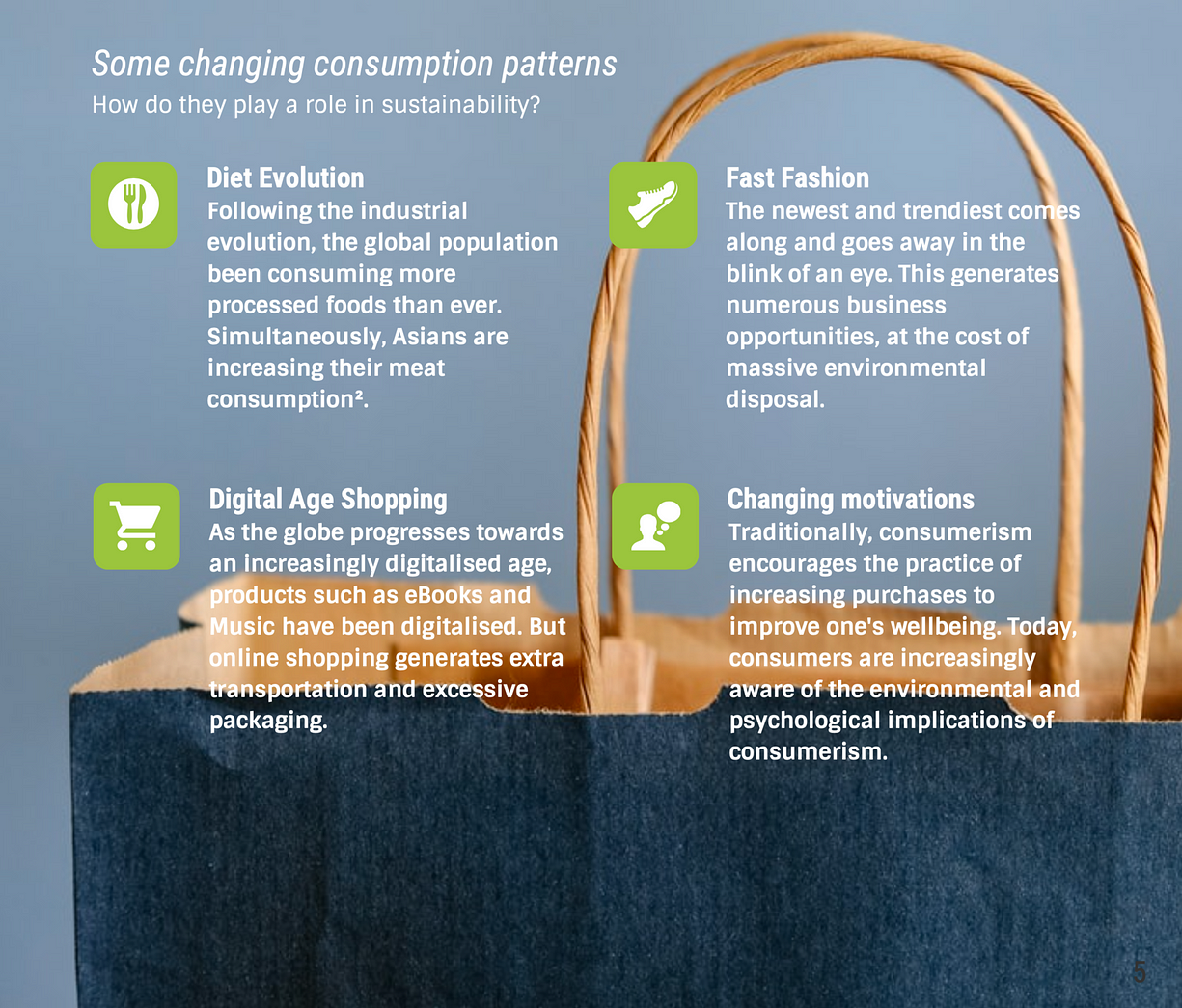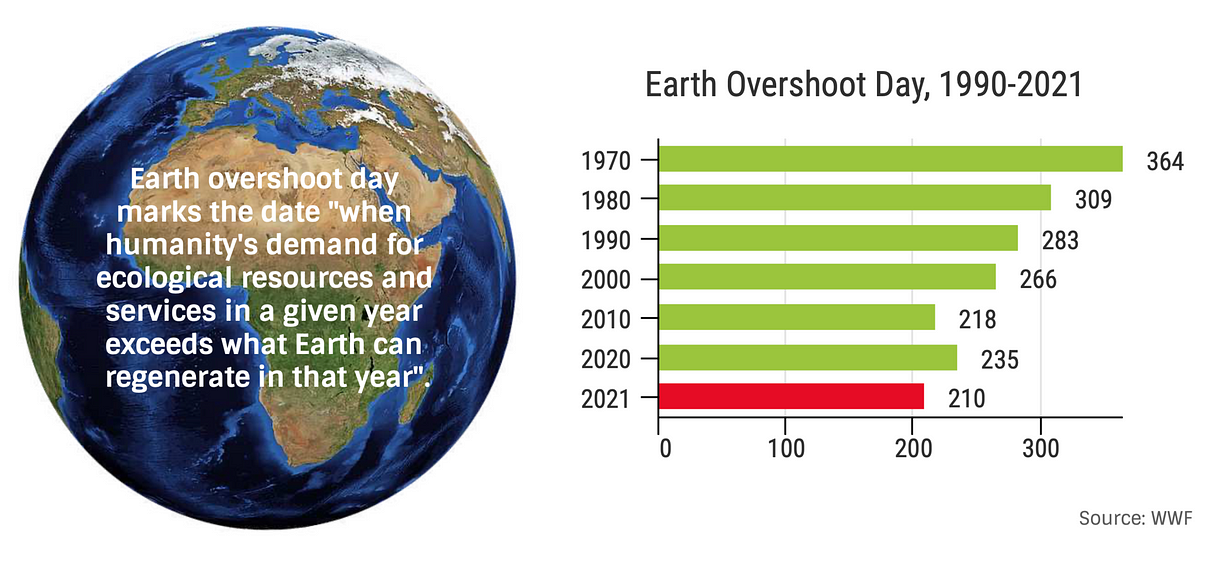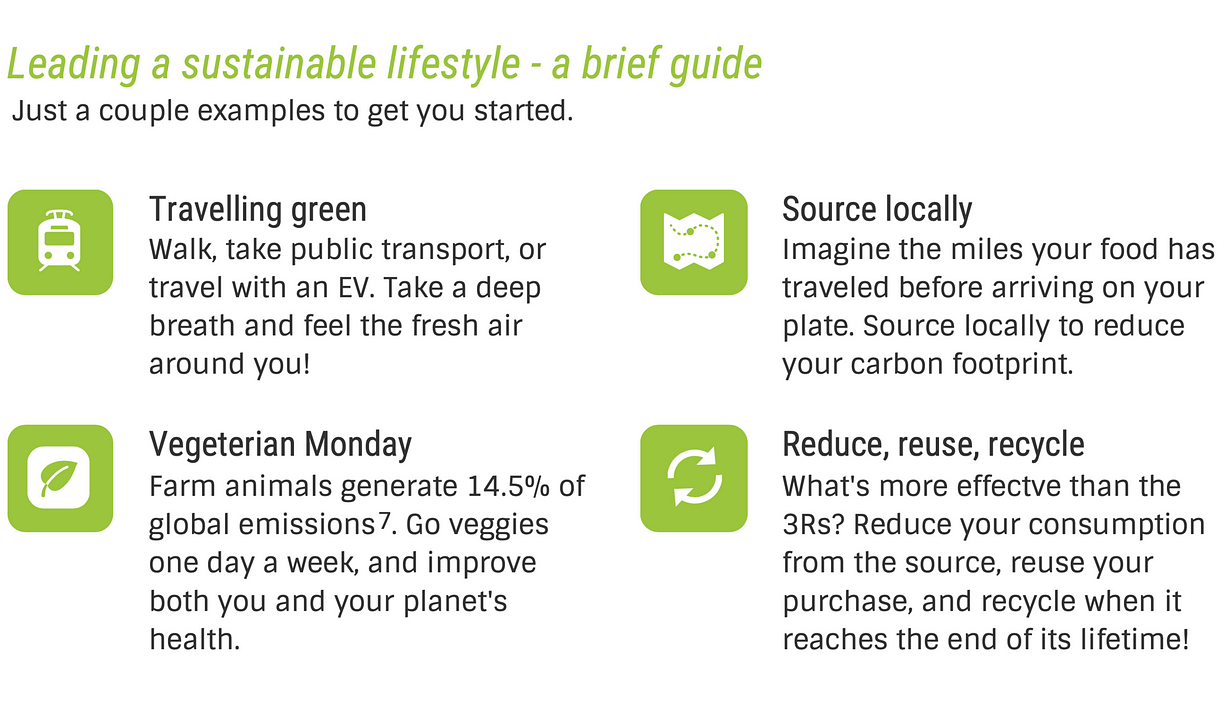
According to the UN Commission on Environment and Development, sustainability is defined by practices that:
“meet the needs of the present without compromising the ability of future generations to meet their own needs”
Achieving sustainability requires a systematic approach to interconnected issues, including a community’s environmental health, social equity and economic vitality¹. Perspectives on sustainability change over time, due to changes in consumption patterns, varying demands from the global population, and the perceived environmental degradation.

Are we going in the right direction?
Have a look at the continuously backward-shifting Earth Overshoot day⁴:

At this rate of consumption, experts predict that our Earth can potentially deplete of all its resources by 205⁰⁵. Therefore, our current consumption model is not sustainable for our future, and there is a need to reduce our consumption or even replenish our resources .
Since societies in the past century have long prioritised economic development while over-exploiting resources at an unsustainable rate, the focus of sustainability now lies upon using finite resources wisely, with a view of long term consequences³. This is a controversial topic, as certain resources that we rely on, like fossil fuels, are non- renewable. Yet, these are resources currently required for key industries of our nation, such as automobiles, transport or energy generation; it is also important to point out the importance of these resources in lifting underdeveloped nations out of poverty.
What can you do?
When abstracted to a personal level, sustainable living is a new lifestyle in which individuals make changes to reduce environmental degradation⁶.

All in all, while the aim of achieving an “environmental equilibrium” and zero carbon footprint is not strictly achievable, sustainable living is most importantly the spirit of achieving it to its fullest.
Just to sum things up
Achieving sustainability is a complex task that requires collaborative efforts from governments and corporations across the world, and most importantly, you. Failure to address these would lead to pollution, resource depletion or other forms of environmental degradation, and further accelerate geopolitical tensions that affect the livelihood of citizens, particularly in underdeveloped nations.
Here at VoltShare, we are enthusiastic of achieving a more sustainable lifestyle as well. With the increasing adoption of electric vehicles (EV), we have an ambitious mission to build an EV charger network across our network that is powered by the community.
Join us on our journey to make our world greener, and read on!
This is an article written for VoltShare.
VoltShare was established in 2019 with one mission in mind — to push the UK towards cleaner transport, by overcoming EV range anxiety.
Beyond the environmental benefits of accelerating EV adoption, our community sharing charger network harnesses the power of sharing economy, bringing communities together and boosting their economic opportunities.
Let’s look forward to a more vibrant and greener future.
Learn more about us on voltshare.co.uk
I am Yan To, soon to be a 3rd year EEE student at Imperial College London. I am fascinated with energy systems and the power industry as a whole, and that to a great extent drew me towards VoltShare.
From my end, I particularly admire the company’s ambitious mission in building a decentralised network of EV chargers, built by the community and for the community. This sharing economy approach fundamentally challenges the somewhat top-down approach adopted by other network providers, and appears to be a sustainable approach in accelerating Britain’s footsteps towards electric.
I am currently an intern at VoltShare, and this is only the first of an upcoming series of whitepaper articles that aim to reflect VoltShare’s values and aspirations. Stay tuned!
References
[1] “What is sustainability?,” UCLA Sustainability, [Online]. Available: https://www.sustain.ucla.edu/what-is- sustainability/. [Accessed 30 6 2021].
[2] T. Lee and J. Hansen, “Southeast Asia’s Growing Meat Demand and Its Implications for Feedstuffs Imports,” 1 4 2019. [Online]. Available: https://www.ers.usda.gov/amber-waves/2019/april/southeast-asia-s-growing-meat- demand-and-its-implications-for-feedstuffs-imports/. [Accessed 16 7 2021].
[3] “The everyday choices we make all have impacts on our planet,” [Online]. Available: https://www.wwf.org.uk/what-we-do/promoting-sustainable-living. [Accessed 30 6 2021].
[4] “July 29: Earth Overshoot Day 2019 is the Earliest Ever,” World Wide Fund For Nature, 29 7 2019. [Online]. Available: https://wwf.panda.org/wwf_news/?350491/Earth-Overshoot-Day-2019. [Accessed 1 7 2021].
[5] K. Reitzel, W. W. Bennet, N. Berger and W. J. Brownlie, “New Training to Meet the Global Phosphorus Challenge,” 8 7 2019. [Online]. Available: https://pubs.acs.org/doi/10.1021/acs.est.9b03519. [Accessed 1 7 2021].
[6] United Nations, “Goal 12: Ensure sustainable consumption and production patterns,” [Online]. Available: https://www.un.org/sustainabledevelopment/sustainable-consumption-production/. [Accessed 1 7 2021].
[7] Food and Agriculture Organisation of the United Nations, “Key facts and findings,” [Online]. Available: http://www.fao.org/news/story/en/item/197623/icode/. [Accessed 13 7 2021].
Leave a Reply